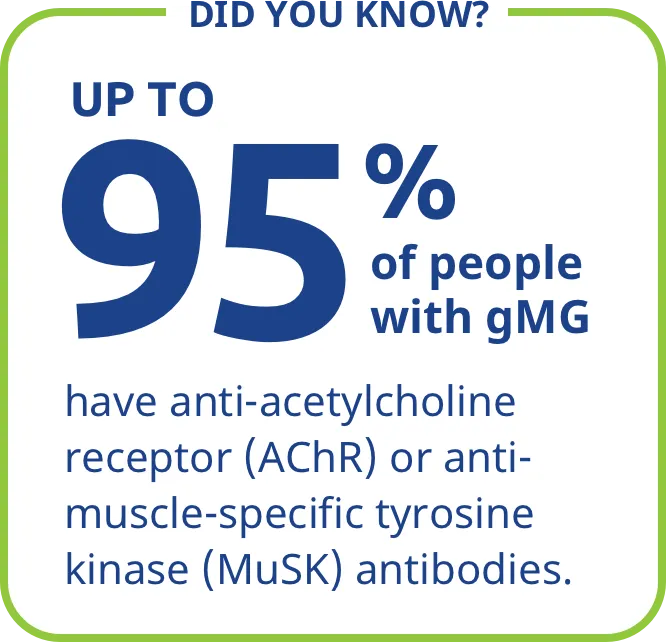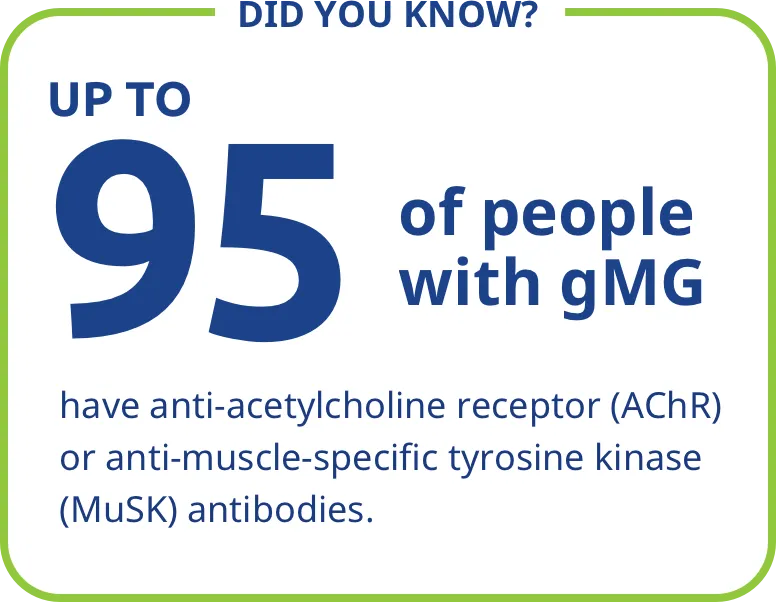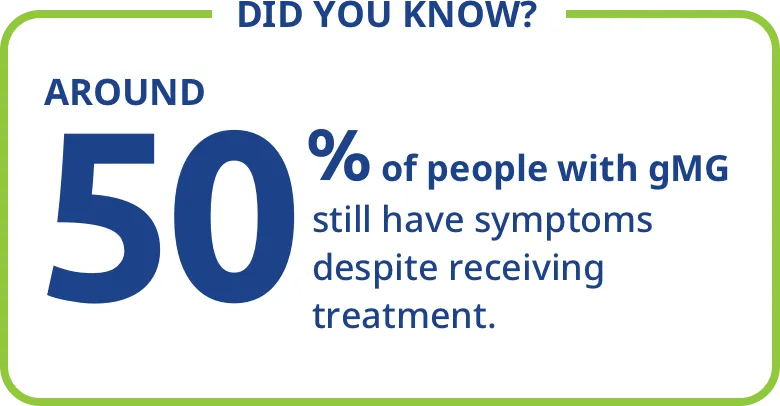IMPORTANT SAFETY
INFORMATION AND INDICATION
WHAT IS RYSTIGGO?
RYSTIGGO is a prescription medicine used to treat adults with a disease called generalized myasthenia gravis (gMG) who are acetylcholine receptor (anti-AChR) antibody positive or muscle-specific tyrosine kinase (anti-MuSK) antibody positive.
WHAT IS THE MOST IMPORTANT INFORMATION I SHOULD KNOW ABOUT RYSTIGGO (rozanolixizumab-noli)?
RYSTIGGO may cause serious side effects, including:
-
Infection:
RYSTIGGO may increase the risk of infection. In clinical studies, the most common infections were upper respiratory tract infections, COVID-19, urinary tract infections, and herpes simplex infections. Your healthcare provider should check you for infections before starting and during treatment with RYSTIGGO. Tell your healthcare provider if you have any history of infections. Tell your healthcare provider right away if you have signs or symptoms of an infection during treatment with RYSTIGGO. Some of the signs and symptoms may include fever, chills, frequent and/or painful urination, cough, runny nose, wheezing, shortness of breath, fatigue, sore throat, excess phlegm, nasal discharge, back pain, and/or chest pain.
-
Aseptic Meningitis:
RYSTIGGO could cause aseptic meningitis. Tell your healthcare provider right away if you develop any signs or symptoms of meningitis during treatment with RYSTIGGO such as severe headache, neck stiffness, drowsiness, fever, sensitivity to light, painful eye movements, nausea, and vomiting.
-
Hypersensitivity Reactions:
RYSTIGGO can cause swelling and rash. Your healthcare provider should monitor you during and after treatment and discontinue RYSTIGGO if needed. Tell your healthcare provider immediately about any undesirable reactions you experience after administration.
Before taking RYSTIGGO, tell your healthcare provider about all of your medical conditions, including if you:
- Have a history of infection or think you have an active infection
- Have received or are scheduled to receive a vaccine (immunization). The use of vaccines during RYSTIGGO treatment has not been studied, and the safety with live or live-attenuated vaccines is unknown. Administration of live or live-attenuated vaccines is not recommended during treatment with RYSTIGGO. Completion of age-appropriate vaccines according to vaccination guidelines before starting a new treatment cycle with RYSTIGGO is recommended.
- Are pregnant or plan to become pregnant or are breastfeeding or plan to breastfeed.
Tell your healthcare provider about all the medicines you take, including prescription and over-the-counter medicines, vitamins, and herbal supplements.
WHAT ARE THE POSSIBLE SIDE EFFECTS OF RYSTIGGO?
RYSTIGGO may cause serious side effects, including:
- See
"What is the most important information I should know about RYSTIGGO?"
The most common side effects of RYSTIGGO include:
- headache
- infections
- diarrhea
- fever
- hypersensitivity reactions
- nausea
These are not all the possible side effects of RYSTIGGO. For more information, ask your healthcare provider or pharmacist. Tell your healthcare provider about any side effect that bothers you or that does not go away. Call your healthcare provider for medical advice about side effects. You are encouraged to report negative side effects of prescription drugs to the FDA. Visit
www.fda.gov/medwatch
or call 1-800-FDA-1088. You may also report side effects to UCB, Inc. by calling 1-844-599-CARE [2273].
Please see the full
Prescribing Information
and talk to your healthcare provider about your condition or your treatment.
For more information, go to www.RYSTIGGO.com or call
1-844-599-2273
1-844-599-2273.
IMPORTANT SAFETY
INFORMATION AND INDICATION
RYSTIGGO (rozanolixizumab-noli) is indicated for the treatment of generalized myasthenia gravis (gMG) in adult patients who are anti-acetylcholine receptor (AChR) or anti-muscle-specific tyrosine kinase (MuSK) antibody positive.
Infections:
RYSTIGGO may increase the risk of infection. Delay RYSTIGGO administration in patients with an active infection until the infection is resolved. During treatment with RYSTIGGO, monitor for clinical signs and symptoms of infection. If serious infection occurs, administer appropriate treatment and consider withholding RYSTIGGO until the infection has resolved.
Immunization
Immunization with vaccines during RYSTIGGO treatment has not been studied. The safety of immunization with live or live-attenuated vaccines and the response to immunization with any vaccine are unknown. Because RYSTIGGO causes a reduction in IgG levels, vaccination with live-attenuated or live vaccines is not recommended during treatment with RYSTIGGO. Evaluate the need to administer age-appropriate vaccines according to immunization guidelines before initiation of a new treatment cycle with RYSTIGGO.
Aseptic Meningitis:
Serious adverse reactions of aseptic meningitis (also called drug-induced aseptic meningitis) have been reported in patients treated with RYSTIGGO. If symptoms consistent with aseptic meningitis develop, diagnostic workup and treatment should be initiated according to the standard of care.
Hypersensitivity Reactions:
Hypersensitivity reactions, including angioedema and rash, were observed in patients treated with RYSTIGGO. Management of hypersensitivity reactions depends on the type and severity of the reaction. Monitor patients during treatment with RYSTIGGO and for 15 minutes after for clinical signs and symptoms of hypersensitivity reactions. If a reaction occurs, institute appropriate measures if needed.
In a placebo-controlled study, the most common adverse reactions (reported in at least 10% of RYSTIGGO-treated patients) were headache, infections, diarrhea, pyrexia, hypersensitivity reactions, and nausea. Serious infections were reported in 4% of patients treated with RYSTIGGO. Three fatal cases of pneumonia were identified, caused by COVID-19 infection in two patients and an unknown pathogen in one patient. Six cases of infections led to discontinuation of RYSTIGGO.
Please see the full
Prescribing Information
for additional Important Safety Information.
















